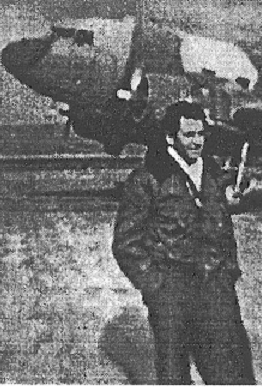SAMUEL BOSHES
Eddy Kaplansky

Sam Boshes in 1948
I first met Sam late in June 1948 at the Galei Yam restaurant on Tel Aviv’s Hayarkon Street; at that time it served as a sort of Machal fliers’ club. Sam had just completed a brief stint with Air Transport Command on the Czechoslovakia-Israel airlift, and was waiting to be assigned a regular IAF squadron.
He was born in Philadelphia to immigrant parents and raised in New York. His father, Abe Boshes, was a well-known professional wrestler and physical training instructor whose pupils included U.S. President Calvin Coolidge.
Although educated largely in the school of hard knocks, Sam was well versed in both classical and contemporary literature. He also wrote well, but rarely. The Hebrew translation of his book on primitive man went through three printings, a rarity in Israel. He enjoyed good music, whether jazz, classical or opera, and knew the backgrounds of many composers and musicians and was familiar with their music. He studied music for a number of years before enlisting in the U.S. Army, specializing in orchestration and composition.
Sam’s World War II record as a U.S. Air Force pilot was quite remarkable. He flew no less than 60 medium and low-level combat missions over occupied Europe in B-26 bombers, some 220 combat flying hours in all, and was awarded the Distinguished Flying Cross, the Air Medal, and 11 Oak Leaf Clusters. I only learned this from his army discharge certificate, as he was never one to brag about his accomplishments.
While he was never exposed to Zionism in his youth, Sam fully understood the urgent need for a Jewish state after the brutal decimation of European Jewry. When the time came, he felt duty-bound, as a Jew and as a human being to help ensure the survival of the nascent Jewish State against the dangers facing it.
Sam was one of 103 Squadron’s founding pilots when it was formed in early July 1948. I felt privileged to be his co-pilot, flying supplies to the settlements in the Negev that had been cut off from the rest of the country by the invading Egyptian forces. It was hazardous work, night flying C-47s in and out of crude desert airstrips surrounded by Egyptian forces. Yet Sam never complained nor lost his cool, tirelessly flying as many round trips as the night allowed.
To resolve an urgent problem, Sam never hesitated to resort to unorthodox measures if other means failed. At one point during his stint as commander of 103 Squadron, the fabric coverings of the C-47’s aileron, rudder and elevator surfaces needed urgent replacement. Because the fabric was no longer taut, responses to pilots’ control actions became dangerously sluggish. When promises by HQ to provide new fabric went unfulfilled for weeks, Sam forced the grounding of a C-47 by slashing the rotting fabric of its elevator control surfaces. He told headquarters what he had done and promised that if the required new fabric wasn’t received soon, the other planes would get the same treatment. His response to ensuing threats of court-martial and accusations of sabotage was, “Do whatever you want, I’m not going to have any pilots kill themselves.” As Sam put it to me in recent years, “A few days later the canvas miraculously appeared, and I felt a lot better.”
After the war Sam settled in Tel Aviv and became one of El Al’s first pilots. In the 1960s he gave up flying and was given an important administrative assignment which he had requested so as to have more time with his family.
Sam died in Tel Aviv on 18th April 2001.
Source: AVI (American Veterans of Israel) Newsletter: Summer 2001

